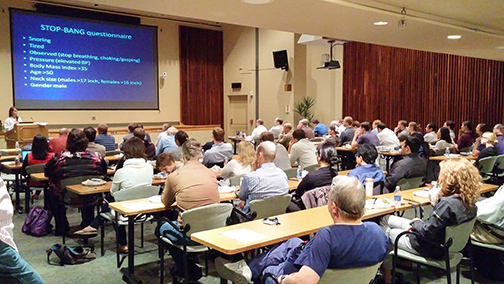
The didactics program at the University of Pittsburgh utilizes a variety of formats to facilitate resident learning. The level-specific comprehensive program starts on the very first day of the CA-1 year and continues until graduation.
CA-1 Introductory Series
During the first month of anesthesiology training, residents undergo an intensive introduction to anesthesiology.
- Pre-Clinical Introductory Course: Lectures and simulation sessions at our department’s Peter M. Winter Institute of Simulation Education & Research (WISER) prepares residents to begin their clinical anesthesiology training.
- Operating Room Mentorship: During the CA-1 Introductory Program, residents work side-by-side with a faculty member and/or senior resident.
- CA-1 Lecture Series: Topics of daily lectures include the basics of anesthesiology, including intravenous, inhalational, and local anesthetic agents, as well as introductions to neurological, respiratory, cardiovascular, and hepatorenal physiology.
Class-specific Lecture Series
Weekly lectures are focused on topics specific to the needs at each level of training.
CA-1 Lecture Series
The CA-1 Lecture series provides a broad overview of anesthetic practice, laying a solid foundation for more advanced practice in the CA-2 year.
- Basics of Anesthesia Practice: In-depth discussions of topics covered during the 20 Day Introductory Program including lectures on the anesthesia machine, ventilators, and the pharmacology of inhalational and intravenous medications.
- Organ Systems Based Anesthesia: Lectures on organ system pathophysiology and implications for anesthetic management.
- Anesthesia Subspecialties: Regional Anesthesia, Chronic Pain Medicine, and Ambulatory Anesthesia
CA-2 Lecture Series
The CA-2 didactic series is a reflection of the subspecialty rotations through which the CA-2 residents rotate. These sessions cover neurosurgical, cardiothoracic, hepatorenal, pediatric, obstetric, and critical care medicine topics. Lectures on fellowship and research opportunities are also presented.
CA-3 Lecture Series
The CA-3 didactic series focuses on preparing residents for life beyond residency.
- Anesthesia Practice: Lecture topics include contracts and negotiations, types of anesthesia practice, finances, and maintenance of certification
- Board Review Series: Subspecialty specific units consist of oral board review and keyword sessions led by faculty moderators. These sessions are resident driven, reflecting the transition from training to independent practice.
Problem Based Learning Discussions (PBLDs)
In addition to the class specific lecture series, a biweekly, faculty-led problem-based learning discussion (PBLD) or workshop is provided. Sample PBLD topics have included trauma anesthesia, complications in anesthesia, professionalism, and red cell salvage techniques. Workshops include transesophageal echocardiography, rapid infusion systems, and thromboelastography.
Simulation Education
One of the crowning achievements of the University of Pittsburgh Department of Anesthesiology and Perioperative Medicine is WISER. WISER is an American Society of Anesthesiologists (ASA)-accredited full scale human simulation center. Our residents attend several courses at WISER facilitated by our faculty members during each year of residency. Each of the courses has well developed objectives and utilizes full scale human simulation.
- CA-1 Courses: Introductory Simulation Program, Central Venous Cannulation, Difficult Airway Management, Introductory to Fiberoptic Bronchoscopy, and the Anesthesia Crisis Leadership Training.
- CA-2 and CA-3 Courses: Residents participate in subspecialty simulations including the Regional Anesthesia & Ultrasound Laboratory (RAUL) and the Introduction to Liver Transplantation Anesthesia Course. The Difficult Airway Management, Fiberoptic Bronchoscopy, and Anesthesia Crisis Leadership Training courses are repeated each year to ensure progression of skills in those areas.
Oral Board Preparation
The University of Pittsburgh Anesthesiology Residency Program has a long tradition of oral board preparation facilitated by faculty who are former oral board examiners for the American Board of Anesthesiology (ABA). Starting in the CA-1 year, a series of mock oral board examinations help to prepare residents to become anesthesia consultants. At any time during their training, but especially prior to taking the oral board examination, residents may access a long list of faculty members to receive additional mock oral examinations.
Additional Educational Opportunities
Numerous other educational opportunities are provided.
- Departmental: Grand Rounds / Journal Club
- Hospital Site-specific: Morning Conferences, Mortality and Morbidity Conferences
- Subspecialty-specific: Pediatric Anesthesia Lecture Series, Obstetric Anesthesia Lecture Series, Regional Anesthesia Lecture Series
Educational Activity Attendance
The University of Pittsburgh Department of Anesthesiology and Perioperative Medicine places a high value on resident education both in and out of the operating room.
- The program director guarantees that all residents are relieved from clinical duties to attend all educational sessions.
- In return for the large and uncommon investment the department makes by providing clinical relief, all residents are required to attend education sessions.
- Sessions that are missed for legitimate reasons such as vacation or post call protected time are able to be made up using our sophisticated internet-based lecture archive system.
